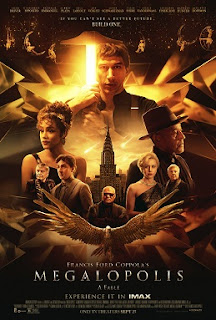Opening this weekend:
Megalopolis--The buzz on this long-cherished, finally realized project by Francis Ford Coppola is that people either love or hate it. But you may find that duality stifling. I kind of hated this movie, and I also kind of loved it.
It's an epic with sci-fi, fantasy and surreal elements, set in a city called "New Rome." New Rome looks exactly like New York, if New York was shot in exquisitely burnished metallic tones by the Romanian cinematographer Mihai Malaimare Jr., and if the men wore '90s-George Clooney haircuts. Against this backdrop, Coppola develops a story that very loosely parallels the Cataline Conspiracy of 63 B.C., as chronicled by Sallust.
Cesar Catalina (Adam Driver) still wants to take over Rome, but in this version he's a visionary architect and urban planner who wishes to create a new utopian downtown full of futuristic, even surreal amenities, made possible by a building material called Megalon. His rival Mayor Cicero (Giancarlo Esposito) has, one might say, more modest ambitions for his town.
Trouble brews when Cicero's beautiful daughter Julia (Nathalie Emmanuel) goes to work for Cesar, and despite a dark secret involving Cesar's late first wife, he and Julia begin to fall in love. Into this basic conflict, rafts of supporting players and subplots and sub-subplots and digressions are interwoven, on the whole pretty chaotically.
The movie opens with a breath-quickening sequence in which Cesar stands on the ledge of the New Rome version of the Chrysler Building, leaning out, tempting gravity and stopping and starting time with the power of his will. The movie that follows seems to be Coppola trying to do the same with his art, and struggling with the awareness that time can't be suspended indefinitely.
It's potent start, but after that Megalopolis splutters and flails for quite a while, with short, scattered, over-edited scenes that fail to draw us in, or sometimes even to communicate what's happening and who's who in relation to who. A half-hour or so in, I was starting to squirm, thinking this could be a really punishing disaster. Very gradually, however, a story begins to take shape that we can invest in.
The intent seems to be satirical, but Coppola's tone comes across as too earnest, even naive, for any real bite. The writer-producer-director sees our society as in decline, and he wants to have "A GREAT DEBATE ABOUT THE FUTURE." This seems like a worthy goal; our current debates about the future seem pretty lacking in greatness, with one side regarding the future as a place where Jesus will come back and then all the elitists will be sorry, and the other side regarding the future as a place where maybe we'll get people's pronouns right.
Coppola certainly has broader, more robust, more soulful hopes for the future than these. But his utopian ideals are unspecific, beyond a sort of technocratic optimism. Cesar's "Megalon" (no relation, apparently, to Godzilla's old rival) is a conveniently vague plot device, and much of what Coppola shows us as evidence of our decline are lots of nubile young women partying too hard.
All this and more undoubtedly makes Megalopolis seem dubious, even campy. It's the kind of grand, glittering cinematic folly that we rarely see any more, because perhaps regrettably we don't have as many auteurs with the same level of delusional hubris as we did half a century ago. Yet it's hard to shake the sense that, at bottom, Coppola is right about contemporary society; that it is time for us to pull our collective heads out of our asses. And his sense of spectacle can get to you. His style here recalls everything from Orson Welles to Abel Gance to Koyaanisqatsi to Things to Come, and after he settles down, his movie begins to get exhilarating.
In no small part, undoubtedly, this is due to the uncommonly glamorous and vibrant cast. The roles are grievously underwritten--Dustin Hoffman in particular makes a fine, energetically weaselly entrance, but then his part seems unceremoniously truncated. But these actors inhabit their pageant figure roles and flesh them out with their own personalities.
Driver is excellent, again showing his ability to be eccentric and vulnerable while retaining the commanding presence of a leading man, and Esposito's pensive, wary eyes make a perfect, puny-spirited contrast to Driver's virility. Emmanuel is able to keep Julia from becoming too much of an idealized love object despite Coppola's gauzy presentation of her.





